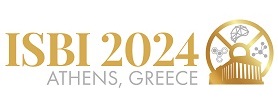ISBI 2024 Workshops
Workshop 1: Through the Lens of Equality: A Workshop on Gender-Informed Research
Maria Flouri, School of Electrical & Computer Engineering, National Technical University of Greece. mflouri@epu.ntua.gr
Eleni Karachaliou, School of Spatial Planning & Development, Faculty of Engineering, Aristotle University of Thessaloniki, Greece. elenakarachaliou@gmail.comThis workshop aims to promote excellence in research by introducing a crucial perspective—the gender dimension integration into research and innovations that leads to further gender inclusivity. Such an integration, can enhance the quality and impact of the research outcomes. This will lead into inclusive research applications and/or innovations free from gender bias.
Research results and/or applications, usually reflect the biases in the viewpoints of the research team.
Therefore, it is crucial to find methods to integrate gender and to produce research results that enhance excellence, challenge gender stereotypes, rethink norms and reference models. To this end, this workshop will explore emerging topics at the intersection of gender studies and other scientific fields.
We will delve into case studies illustrating how gender dynamics influence research outcomes and offer practical strategies for integrating gender equality seamlessly into experimental design, data analysis, and interpretation.Workshop 2: ProC-AI: Integrating Imaging Data and AI Models for Supporting Precision Care Through Prostate cancer’s Continuum (supported by ProCAncer-I EC project)
Prof. Manolis Tsiknakis, FORTH-ICS & ECE, Hellenic Mediterranean University (HMU), Greece, tsiknaki@ics.forth.gr
Dr. Nikolaos Papanikolaou, Champalimaud Foundation, Portugal, nikolaos.papanikolaou@
Prof. Kostas Marias, FORTH-ICS & ECE, Hellenic Mediterranean University (HMU), Greece, kmarias@ics.forth.gr
Prof. Haridimos Kondylakis, FORTH-ICS & ECE, Hellenic Mediterranean University (HMU), Greece, kondylak@ics.forth.gr
Dr. Sara Colantonio, Italian National Research Council (ISTI-CNR), Italy, sara.colantonio@isti.cnr.itThe vision of the ProCAncer-I project is to develop AI medical image-based models to address unmet clinical needs in the field of Prostate Cancer where overdiagnosis and overtreatment are due to the lack of robust biomarkers. To achieve this, we created the largest interoperable, high-quality mpMRI (multi-parametric Magnetic Resonance Imaging) dataset worldwide for the study of prostate cancer (PCa). In realizing this objective, the ProCAncer-I repository, called ProstateNet, is envisaged to exceed by at least one order of magnitude current datasets and has enabled the implementation of trustworthy AI modelling that outperform current quantitative MR imaging biomarker- based studies, thus paving the way for AI-assisted prostate cancer care.
Workshop 3: Cross-Society Innovation for Translational Applications of Medical AI
Shandong Wu, PhD, Associate Professor of Radiology, Biomedical Informatics, Bioengineering, Intelligent Systems, Clinical and Translational Science, Director of Pittsburgh Center for AI Innovation in Medical Imaging, University of Pittsburgh, School of Medicine, USA wus3@upmc.edu
Lei Xing, PhD, Jacob Haimson Professor, Director of Medical Physics of Radiation Oncology Dept.; Joint faculty positions in Dept. of Electrical engineering, Bio-X, and Molecular Imaging Program, Stanford University, USAArtificial Intelligence (AI) is becoming ubiquitous and it grows rapidly in biomedical domains. Medical imaging is spearheading the development and translation of AI in medicine, showing early success in many applications. Medical imaging is a major data modality and it links many medical subspecialties and thus the related research and clinical communities/societies. Today, there are many research topics and opportunities arising beyond the important focus of pure technical innovation. The motivation of this workshop is to bring other related research communities to the ISBI ecosystem to extend information exchange, foster collaboration, and inspire cross-subject innovation towards translational applications of AI in the medical imaging arena. Specifically, we will invite prestigious speakers as representatives of the Radiological Society of North America (RSNA) community, the American Association of Physicists in Medicine (AAPM) community, and American Association of Neurological Surgeons (AANS) community to share frontiers, progresses, insights, perspectives, and challenges of AI research in their respective fields, through which we expect to chart new collaboration opportunities to advance AI in medical imaging research.
Workshop 4: MACHINE LEARNING FOR NEURODEGENERATIVE DISORDERS
Prof Anubha Gupta Professor, IIIT-Delhi, anubha@iiitd.ac.in
Prof Deepti R. Bathula Associate Professor, IIT-Ropar, bathula@iitrpr.ac.in
Prof Neelam Sinha Associate Professor, CBR-IISc, neelamsinha@iisc.ac.in
Prof Selin Aviyente Professor, Michigan State University, aviyente@msu.eduThe Machine Learning for Neurodegenerative Disorders (MLND) workshop is proposed to provide a platform for disseminating and discussing the latest and innovative applications of machine learning for better understanding of Neurodegeneration. Neurodegeneration leads to severe crippling of normal life. Although several of these conditions cannot be completely treated, it is worthwhile diagnosing early. Early diagnosis allows a critical window of interventions where recovery or slower progression can be made possible. Towards this, several modalities like EEG, MEG, MRI and clinical assessments can be utilized to determine the status of the brain. Time series data from multi-channel EEG headsets and MEG scanners can be studied for subtle changes to detect anomalies. Analysis in multi-dimensional spaces such as time-frequency, latent spaces of feature-embeddings, non-linear analysis, etc can be leveraged for robust inferences. The inferences can also be substantiated by analysis of imaging data. It is well known that MR imaging can capture gross structures with structural MRI, brain functioning with fMRI and microstructures can be imaged using Diffusion MRI. Advancements in Machine learning such as Deep learning, Persistent homology, IRM-framework, causal modelling, etc can be leveraged in understanding neurodegeneration


